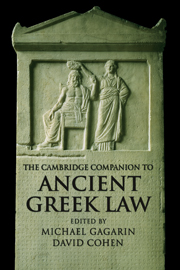1 - The Unity of Greek Law
from Part 1: - Law in Greece
Published online by Cambridge University Press: 28 August 2006
Summary
It may surprise those who are new to the field to learn that the very expression Greek law is a point of contention for scholars in the field. For the most part, those in the United States and the United Kingdom avoid the expression, and only two books with “Greek law” in their title have been published in English since Pringsheim's Greek Law of Sale in 1950. Even Sealey, who accepts Greek law as a valid concept, entitled his book on the subject The Justice [not Law] of the Greeks (Sealey 1994; see Gagarin 1996). This situation contrasts sharply with the case of Roman law, which is unproblematic in this regard: histories of, textbooks on, and introductions to Roman law appear regularly. Continental scholars tend to be more sympathetic to the notion of Greek law, though they too tend to avoid the expression in titles (Biscardi 1982a is a notable exception).
Although nineteenth-century scholars were aware that the existence of dozens of politically independent Greek poleis (or “city-states”) made the concept of Greek law problematic, they generally agreed that the laws of different cities, in the words of Ludwig Mitteis, “rested on the same juristic conceptions.” Mitteis' position dominated the first half of the twentieth century, until it was strongly attacked by Moses Finley, first in a review of Pringsheim's book mentioned above and later in a more comprehensive essay entitled “The Problem of the Unity of Greek Law.”
- Type
- Chapter
- Information
- The Cambridge Companion to Ancient Greek Law , pp. 29 - 40Publisher: Cambridge University PressPrint publication year: 2005
- 37
- Cited by

